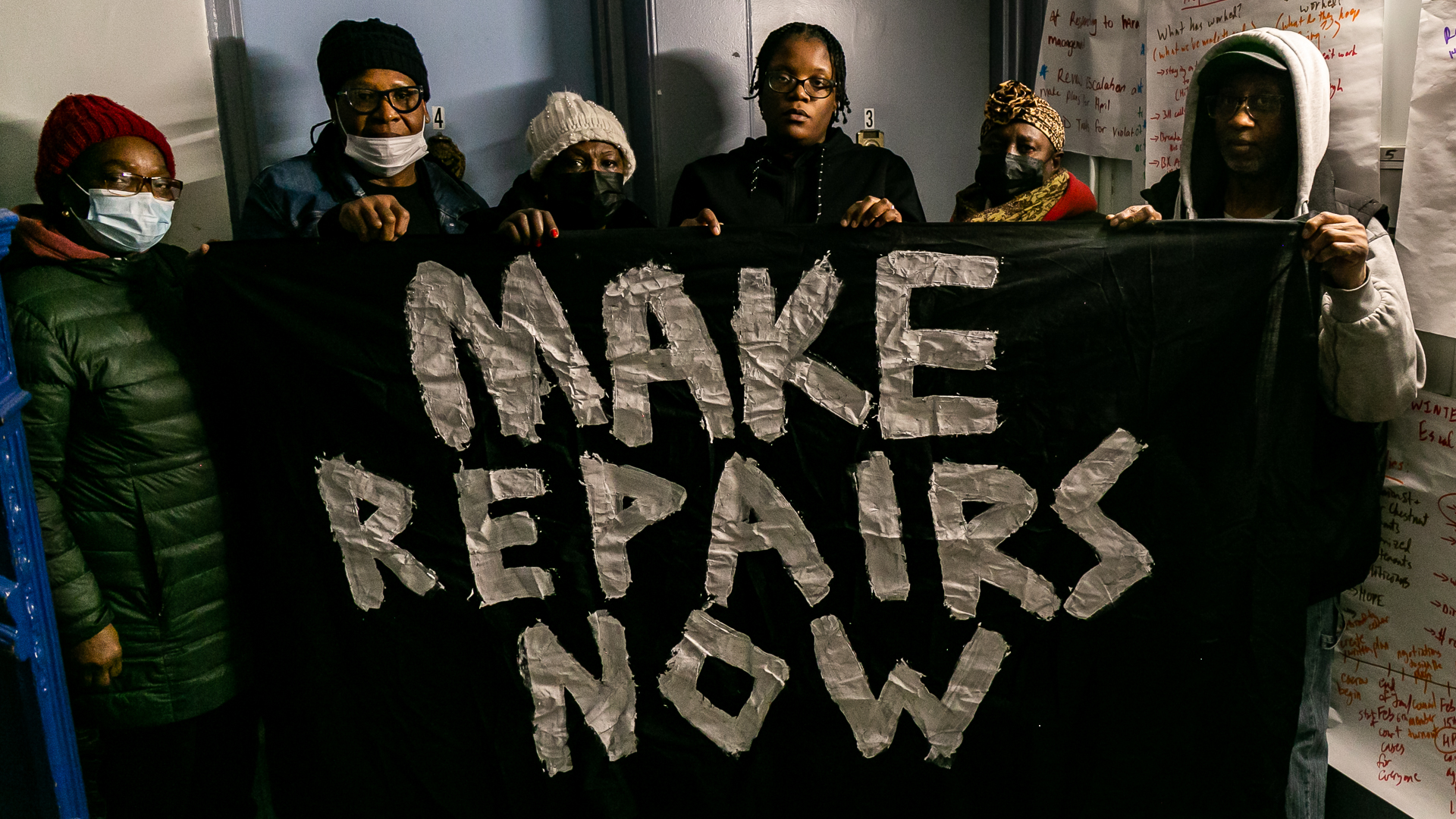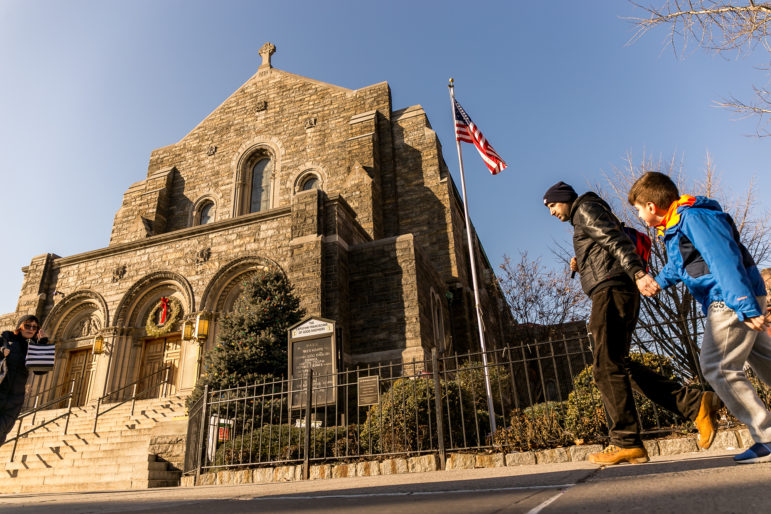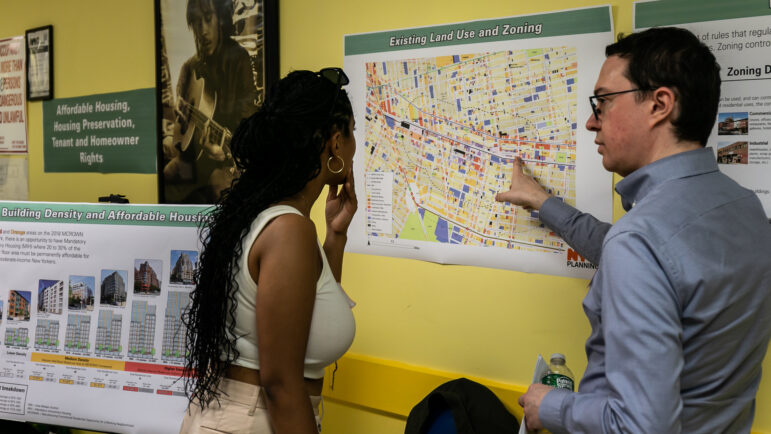Legal service providers who aid tenants through the city’s Anti-Harassment Tenant Protection (AHTP) program say their efforts are being diminished by recent city contract cuts, which saw their funding for the next three years slashed by more than $25 million.

Adi Talwar
Members of a Brooklyn tenant association in their building in 2023; the group received assistance through the Anti-Harassment Tenant Protection (AHTP).Lizbeth Hoyos was born and raised in the East Harlem apartment she still lives in today. Over those more than three decades, the building on East 103rd Street has “had lifelong issues.”
“We went through many, many complaints throughout the years regarding individual apartments that went ignored and…just the building overall,” she said.
But this past spring, they finally began to see some changes, after Hoyos and her neighbors—with the help of the advocacy group Community Voices Heard, and tenant lawyers with the The Legal Aid Society and Legal Services NYC (LSNYC)—filed a lawsuit against their current landlord, alleging unlawfully-handled security deposits and unaddressed repairs.
The tenants were connected with the legal help through the city’s Anti-Harassment Tenant Protection (AHTP) program, launched in 2016 to aid low-income renters with issues like illegal rent hikes and dangerous building conditions.
“They’ve been certainly a very, if not the most useful tool that we’ve had so far in our fight,” Hoyos told City Limits. She and her neighbors—primarily immigrant New Yorkers and Spanish speakers—now hold regular tenant meetings, and their building owner has made some fixes, including repairs to their stairs, door locks and the intercom system.
“Without them, we definitely wouldn’t be in the position that we are in now to actually get these repairs to be done,” she said of the tenant lawyers and organizers they’ve had access to through the program.
But the organizations that perform this work under AHTP, who are members of a group of service providers called the LEAP Coalition, say their ability to help renters is being diminished by recent city contract cuts, which saw their funding for the next three years slashed by more than $25 million.
In Fiscal Year 2025 alone, which kicked off July 1, the groups’ funding was reduced by 19 percent, from $42,927,830 to $34,817,330, a Department of Social Services (DSS) spokesperson confirmed—a roughly $8.1 million loss.
According to DSS, the changes were made in order to shift additional funds to providers doing work under the city’s Right-to-Counsel program, which connects low-income tenants facing eviction with free legal representation in housing court. That initiative, passed by city lawmakers in 2017, has never been funded enough to cover everyone eligible for it.
The most recent Right-to-Counsel contract awarded $149 million to legal organizations doing this work in Fiscal Year 2025, up from a previously planned $136 million, according to DSS. That boost allowed the city to double its number of anti-eviction service providers in Queens (from three to six) and add a new provider in the Bronx, a spokesperson said.
But LEAP Coalition members, while acknowledging the importance of Right-to-Counsel, said expanding it at the cost of AHTP is short-sighted. The two initiatives tackle different types of work, they argued, with AHTP taking more proactive actions against landlords to improve building conditions and protect tenants from ending up in housing court in the first place.
“It’s like the upstream of how to keep people out of housing court so that they are not in eviction proceedings,” said Ami Shah, deputy director of citywide housing and legal services at LSNYC.
Since the state strengthened protections for rent stabilized tenants in 2019, more landlords have been engaging in harassment and “harsher tactics that are not through the court system,” Shah added, such as illegal rent increases or letting buildings fall into disrepair.
“This work really allows us to fight that, and build tenant power and keep low-income families out of shelters, in their homes, in the communities they’ve been living [in], so much earlier than at the point when they’re already in eviction court,” Shah said.
That type of preventative work is less expensive than the cost of homeless shelter beds, LEAP providers argue. The city’s shelter population has more than doubled over the last two years—an increase that includes tens of thousands of migrants and asylum seekers—with more than 146,000 people in shelter at the end of June.
AHTP’s work also allows for broad impact. Attorneys under the program often work to compel landlords to make building-wide repairs, and maintain good conditions for tenants in the city’s aging affordable housing stock.
“Oftentimes, when you’re bringing a case about repairs, you can represent 10 people in a building when those repairs get made. That helps all 70 people that live in that building, whether or not they are directly represented by you or not,” Shah said.
The LEAP Coalition’s members, whose work is coordinated by the organization TakeRoot Justice, are urging the Adams administration to restore the lost funding. They were only notified of the cuts at the end of June, roughly a week before the new contracts were going into effect, and many organizations had already hired staff and inked deals with partnering agencies to get the work done.
The reductions come as Mayor Eric Adams campaigns to pass his City of Yes for Housing Opportunity plan, a series of zoning reforms to spur new residential construction and fill the city’s housing shortage.
Part of that fight, says Christine Clarke, chief of litigation and advocacy at LSNYC, is preserving the city’s existing affordable housing—what AHTP providers do in their efforts to stop landlords from de-regulating a rent stabilized homes, displacing tenants or ignoring repairs.
“It just shows a lack of actual big picture strategy of how to address the affordability crisis,” Clarke said. “We’re there, taking a front-row seat and working in the communities where people are experiencing this.”
To reach the reporter behind this story, contact Jeanmarie@citylimits.org
Want to republish this story? Find City Limits’ reprint policy here.








